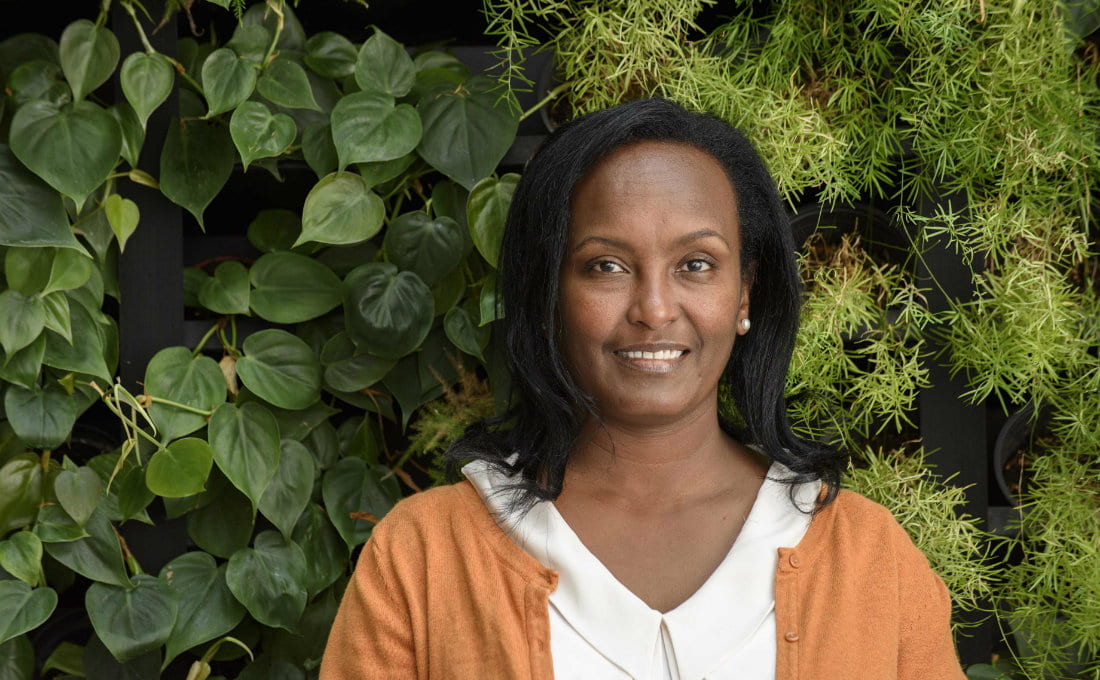International Development Ethnographer and Vice-Chancellor’s Fellow, Tigist Grieve, is researching marginalised voices in rural Ethiopia in an effort to explain the ongoing difficulties in achieving education for all globally.
In a year where we’re celebrating the 50th anniversary of men landing on the Moon, we still can’t achieve access to education for all across the globe.1 I continually ask myself, why not? How is it so hard? We make it complicated by not listening and by not understanding other people’s perspectives. Why is it the trend to look at people living in poverty from a deficit point of view? My work as a Vice-Chancellor’s Fellow has given me the opportunity to build on my years of PhD research, which focuses on improving the educational outcomes and empowerment of adolescent girls in Ethiopia. I want to bring those voices of marginalised adolescent girls to the ongoing debate of gender and empowerment, while recognising the effort and resilience that goes unnoticed when we have a deficit-based perspective about certain categories of people.
I want to inspire people to go where others would never expect them to by engaging with relevant stakeholders in Ethiopia and beyond.
In particular, my work is about seeing the social, engaging and responding to local voices. In the words of the writer Arundhati Roy ‘There’s really no such thing as the ‘voiceless’. There are only the deliberately silenced, or the preferably unheard.’
My inspiration for examining voice is the inspiring work of Robert Chambers, author of Rural Development: Putting the Last First. I am listening to the everyday lived experience of people. My work is about voice – the voices of children, of women, of the resources-strapped communities in rural areas. Really, international development policy to date hasn’t given adequate space to hear them, it’s not informed by their experiences or by their voices.2 Even where there is a claim for ‘voices of the poor’ it is proxy voices where the privileged few speak on their behalf from a position of assumption.
My work is focused on disseminating my research findings back to target communities in Ethiopia, to spark constructive debate about rural schooling and development. I want to do this in a way that challenges policy makers, development practitioners, donors, teachers, researchers and communities themselves.
I’m researching within two communities in Ethiopia, a peri-urban and rural, chosen because they are under the same local authority, but with considerable geographical differences. I believe there’s a misconception that certain communities don’t understand the value of education, but we need to research why, looking at policy, political economy, culture, social pressure. For example, despite the increasing enrolment, school attendance is very poor, not because education is not valued but because the expectation that children will be working around their homes and farms is greater. Girls’ attendance is much lower than boys because societal pressure is higher on girls. Boys have much better autonomy in how they use their time while girls in rural areas are time-poor. My work confirms the importance of recognising the difficulty of transforming gender relations through schooling alone.
We need to make informed decisions through lessons learned from quality research. The joy of being a researcher at the University of Bristol is the opportunity to collaborate with world-leading multi-disciplinary teams interested in developing ideas to meet the global challenges of development.
In analysing categories of children and childhood experiences, I’ve discovered that children are highly mobile in search of opportunities for them and their families, starting from a very young age. My research showed that the ultimate question in rural Ethiopia is ‘Who is this child to me?’ 16 per cent of children in households in my area of research are not in their biological families and relatedness matters in this culture. This context is so important in Sub-Saharan Africa, which has such a huge population of children orphaned by the AIDS epidemic.3 The concept of family is a complex one and undertheorised in the context of Ethiopia. If you’re related to the head of the household, you have access to better resources.
I’m also looking at issues such as access to water and autonomy of reproductive health (or lack of). These also play a part in preventing girls from obtaining an education. A school without a water source or toilet facilities is not hospitable to children, even less so to adolescent girls dealing with menstruation. Climate change also has a part to play in water scarcity issues, with the African continent identified as one of the parts of the world most vulnerable to the impacts of climate change.4
The University’s second cohort of 15 Vice-Chancellor’s Fellows started in the academic year 2018-19, joining the 12 from 2017-18. Alumni and friends have contributed funding for six of the Fellows to date. For more information on the Fellows see our dedicated web page.
References
1 UIS. (2018). One in Five Children, Adolescents and Youth is Out of School. [Available online at: uis.unesco.org/sites/default/files/documents/fs48-one-five-children-adolescents-youth-out-school-2018-en.pdf.] (last accessed 23.08.19).
2 Brock, K. and McGee R., (eds) (2002). Knowing Poverty: critical reflections on participatory research and policy. Earthscan.
3 Unicef. (2016). For Every Child, End AIDS: Seventh Stocktaking Report, 2016.
4 Serdeczny, O., Adams, S., Baarsch, F., Coumou, D., Robinson, A., Hare, B., Schaeffer, M., Perrette, M., Reinhardt, J. (2016). Climate change impacts in Sub-Saharan Africa: from physical changes to their social repercussions. Regional Environmental Change. 1-16.

